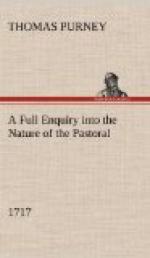Breath soft ye Winds, ye Waters gently flow, Shield her ye Trees, ye Flow’rs around her grow, Ye Swains, I beg ye pass in silence by, My Love in yonder Vale asleep doth lye.
My not disliking Thoughts taken from the CANTICLES, makes me think that ’tis not so much the Thoughts being stolen from THEOCRITUS or VIRGIL that makes me dislike ’em, as the poor and mean Figure they make in Poetry. Could Poets take as fine Pastoral Images from the Antients, as this of Philips, I believe no one but would be pleased by ’em, come from whence they would. But the Thoughts which our Writers take from the Antients are such, that would they trust their own Genius’s, I am satisfied they would, at least, not have worse, nor more false ones.
I was a little surprized when I first read Mr. Philips’s 5th Pastoral, (which has the most of a story or Fable of any) how he came to take the very story which STRADA tell’s to show what a Genius CLAUDIAN had. OVID’s Metamorphoses is full of such Fairy and Romantick Tales, and he might well enough have given a Description of a Bird’s contending with a Man for the Prize in Singing, but methinks ’tis not wholly probable enough for a Fable in Pastoral.
Now the Cause of my mentioning this in Mr. PHILIPS, is to persuade, if possible, those who shall hereafter engage in Pastoral-Writing to trust to their own Genius’s. By that means we may hope Pastoral will, one Day, arrive at it’s utmost Perfection, which if Writers pretend to go no farther than the first who undertook it (I mean THEOCRITUS) it never can do. For ’tis no one Genius that can bring any Kind of Poetry to it’s greatest Compleatness. And all know by what slow Steps Epick Poetry, Tragedy, and Comedy arrived at the Perfection they now bear.
SECT. Last.
But now the time of Day drew on, when Cubbin must drive his Heifers to Water. Sophy therefore withdrew, but promised to be there in the Evening agen.
When the Heat of the Day was over, and the Evening Air began to breath in a delightful manner, Sophy accordingly appear’d, and setting him on the Rushes, that esprouted up by the River side, open’d his Book, and proceeded in the following Manner.
The End of the Third part.
PART IV.
CHAP. 1.
Of the Pastoral Language in general.
I must here premise, that I intend not here a full and compleat Discourse on the Pastoral Language; for that would take up a Volume. But I would recommend it to some other Hand; for I know nothing that would be more acceptable to the Letter’d World than an Enquiry into the Nature of the English Language.
But there is no Dialect or Part of our Language so little understood, as that which relates to Pastoral; nor none (not even the Sublime) so difficult to write. Of all who have attempted Pastoral in our Tongue, no one (but SPENCER) has gone so far as even the weakening and enervating their Dialect; yet after that is perform’d, a Pastoral-Writer has gone but half way; for after the Strength is taken away, a Tenderness and Simplicity of Expression must supply its Place, or else ’tis only bald and low, instead of Soft and Sweet.




